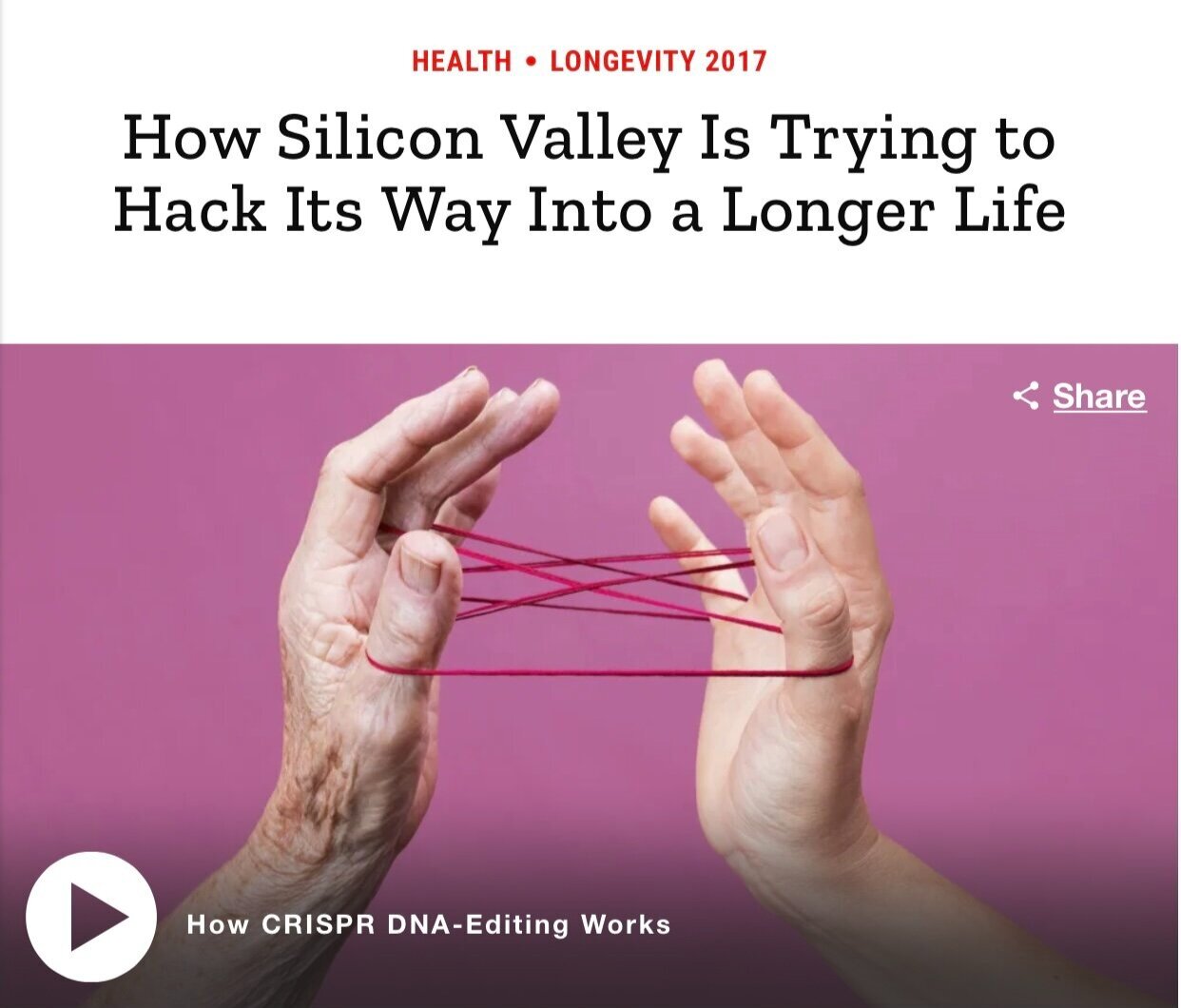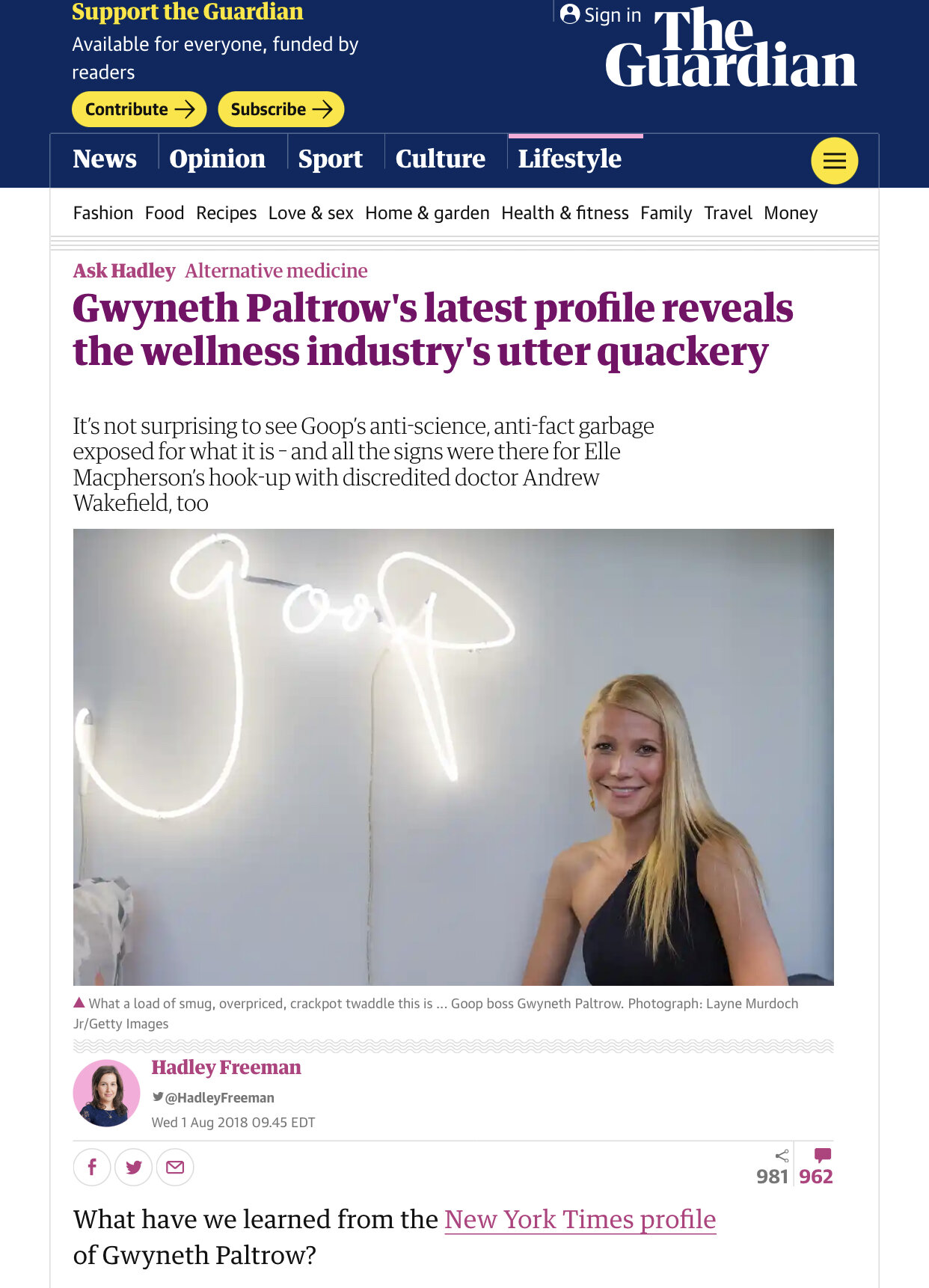Why Is "Wellness" Called “Biohacking” When Men Do It?
by Marissa Pomerance
First, it must be said that “biohacking” is an eyerollingly nonsensical word used only when the spheres of “tech bro” and “wellness startup” overlap.
And yet, somehow, it conveys a certain...legitimacy.
“Bio”— it’s BIOLOGY. So, it must be real science. And “hacking” is for smart people! Nerds who love science and computers and solving problems but are also kind of badass renegades who are disrupting things.
The word is stupid, but understanding it is important.
Because, in our endless pursuit of understanding wellness and ourselves and why we do what we do, we realized something.
Only men are called “biohackers.” Case in point:
Women, who do the exact same thing, are “wellness influencers” or “anti-science” or “idiots peddling harmful narratives about diet-culture.”
Why?
Well, you probably know why.
“Wellness” isn’t taken seriously.
Yes, we are a “wellness” brand. For women. So of course, we’re biased.
But even as a “wellness” brand, we understand that wellness is not always a...respected word. I mean, our tag line is, “a wellness brand for people who sort of hate wellness brands.”
So we get it.
We don’t like to pass judgement on people’s beliefs, or the things they do to make themselves feel good, as long as those things aren’t harming others. You want to drink a bee pollen smoothie? Gua sha your entire body for “lymphatic drainage”? Take $200 supplements? Go for it. We often do, too. Like this. And this. And this.
Others...don’t feel the same way. People in wellness— and let’s be honest, women in wellness— are endlessly mocked for these things.
One only need look at way the media consistently approaches wellness, wellness trends, and women IN wellness with judgement and derision.
Like in this article from Vox:
And The Guardian:
And First We Feast:
But then approaches biohacking with curiosity, which gives it an immediate sense of authority.
Like with this article from Vox:
And The Atlantic:
And Time:
In wellness, fads like supplements and adaptogens, or trendy diets, are deemed outrageous, expensive, and ridiculous. In biohacking, however, supplements are called “nootropics” that “increase brain function and performance,” and diets are lauded as “hacks” to increase lifespan.
Do ANY of these things work? Are they ALL marketing schemes? The jury is still out. But whether they have efficacy isn’t really the point. The point is that wellness trends are packaged up in a layer of dismissiveness when it comes to women and openness when it comes to men.
Women’s interests are trivialized.
“Wellness”— as an idea, as a word— is heavily associated with women. With yoga-loving, supplement-taking, “woo-woo” women. Who spend $11 on an oat matcha latte and $150 on a pair of “sustainable” workout leggings.
And women like that irk people.
They’re rich. They’re privileged. They’re anti-science. They are using “wellness” to lose weight. To be beautiful. To pursue vanity and frivolity.
And once we decide something is a “woman’s” interest (or better yet, a woman’s “role”), it’s no longer legitimate.
Fashion, beauty, or ya know, raising children, are all stereotypically associated with women. They are all also things we undervalue— intellectually or financially. One only need look at this pandemic, and how it’s pushed women out of the workforce and back into the home, with no additional compensation, to see that.
Our interests are often deemed “uncool.” Think about it— growing up, was there anything less cool you could do than admit you liked boy bands and glitter and girly stuff? It was the highest compliment— the height of cool— to be “one of the guys.”
Men’s interests are, without question, considered legitimate. As intellectual pursuits. As real businesses, not just frivolous side hustles. As solutions. As effortlessly cool.
Enter: biohacking.
A way to engage in “wellness,” without being associated with all that feminine bullshit. To re-brand a beleaguered (read: women-led) concept as science-backed and valuable and “cool.”
Bee-pollen smoothie? Must be a reason for it. Infrared saunas? Solid science. Intermittent fasting? When men tout it, it’s a science-backed “productivity hack.”
When women tout it, it’s a dangerous example of disordered eating.
Just look at this article, examining “biohacking” as an interest amongst Silicon Valley bros who, they say, are using cutting edge science to try to live longer:
They describe a (male, obviously) biohacker as “data-driven” and “ruthlessly pragmatic” for injecting himself with hormone shots and taking natural supplements and microdosing LSD.
Any of those things sound familiar? If they do, it’s probably because they’re the exact same things that the OG Queen of Wellness, Gwyneth Paltrow, has been continuously, publicly skewered for.
Just one month prior to the publication of that aforementioned article, that same publication denounced Goop as “utter quackery” for engaging in these similar wellness trends. They also blamed GP for making psychedelic drugs, like the ones used by that aforementioned biohacker, “uncool.”
So we don’t get to claim wellness as “biohacking” because it’s assumed that we use wellness for vanity. For losing weight and ridding ourselves of wrinkles and generally trying to look younger and more beautiful.
And those aren’t considered “cool” or acceptable interests for people who are cultured, intellectual, or ambitious.
Let’s not forget how we got here.
Yes yes. Again, we ARE a wellness brand. So, bias, etc etc.
But let’s not forget why wellness brands exist.
Women were fed up with feeling shitty. They were fed up with feeling ignored and belittled. So they sought out answers—sometimes, using alternative, lesser-known means; other times, engaging in damaging pseudoscience, the lines between the two feeling blurred and hazy, even to the shrewdest of consumers.
But passing judgement on women—subjecting them to a kind of scrutiny that isn’t applied to men—ignores the underlying reasons why women are attracted to wellness. It’s just one more dismissal in a long line of them. One more way we’re stereotyped and scorned for the problems unique to us.
Maybe calling men “biohackers” doesn’t seem like a big deal. Maybe it’s not. But examining the “why” does feel like a big deal.
Off to jade roll my face, drop CBD under my tongue, and make a matcha latte with oat milk. Byeeeeee.
Xoxo,
Marissa
Marissa Pomerance is the Managing Editor of The Candidly. She’s a Los Angeles native and lover of all things food, style, beauty, and wellness. You can find more of her articles here.











